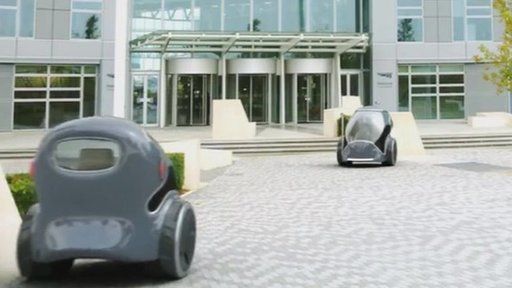UK government paves way for driverless cars
- Published

The government has announced that it wants to make the UK a world centre for the development of driverless cars.
It said it would conduct a review next year to ensure that the legislative and regulatory framework is in place for such vehicles to be incorporated on Britain's roads.
It will also create a £10m prize to fund a town or city to become a testing ground for autonomous vehicles.
Milton Keynes is already experimenting with driverless pods.
By mid-2017 it is planned that 100 fully autonomous vehicles will run on the town's pathways along with pedestrians, using sensors to avoid collisions.
The plans for self-drive cars were announced in the chancellor's National Infrastructure Plan.
Radical change
Much of the hype around driverless cars centres around Google. Its self-drive car recently completed 500,000 miles (804,000km) of road tests.
In the US, California, Nevada and Florida have passed legislation to allow driverless cars.
This month Nissan carried out the first public road test of an autonomous vehicle on a Japanese highway.
Many envisage a future when we may not own cars at all but simply hail one to fulfil all our transportation needs.
"I call it mobility on demand. You pop out your mobile phone, say where you want to go and how many people and in a short amount of time a vehicle rolls up," said Brad Templeton, software engineer and adviser to Google on its self-drive car project.
"People will be like the millionaires of old where you just had a driver that did everything. These cars will worry about recharging, parking and refuelling. They will drive down a road without you paying much attention to it," he said.
Such cars will make cities both safer and greener, he thinks.
"It will radically change the amount of energy we use, how congested our streets are and eliminate most of the parking lots that take up a huge amount of space in our cities.
"Humans kill 1.2 million people in car accidents each year so the idea of being able to make a safer vehicle is very appealing," he said.
Many think that the issue of who will be liable in the event of accidents will hold up the development of autonomous vehicles but Mr Templeton is not convinced.
"I think only the barristers will find it the most interesting question," he said.
"For me the more interesting question is whether a machine is more liable than a drunk driver. Countries that decide a machine is more liable will slow the development of this technology," he added.
Car manufacturers suggest that autonomous vehicles will be on the roads within the decade.
Google has given 2017 as the date its cars will hit the roads. Not to be outdone, Elon Musk, head of electric car company Tesla Motors, has said he will have such vehicles ready in 2016.
Other car manufacturers, including Daimler and Nissan have given a 2020 date for their own versions.
Much of the underlying technology for autonomous driving is already installed in cars such as the Mercedes S500 which uses onboard radar and 3D stereoscopic cameras to gauge the distance from other cars.
- Published7 November 2013
- Published16 July 2013
- Published14 February 2013